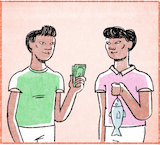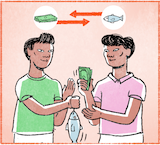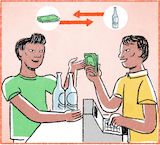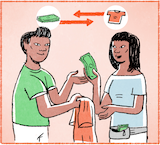



เขากำลังเฮ็ดหญัง มีพุซายสองคน เขากำลังสิซื้อสิขายปากัน
มีพุซายคนหนึ่ง ใส่เสี้ยสีเขียว ใส่เสี้ยแขนสั้นดอก กำลังถือเงินอยู่ กะถือเงินหลายเติบ ถือเงินแบ้งสีเขียว
เงินแบ้งสีเขียวเป็นใบสี่เหลี่ยม มีหลายเติบ มีหลายใบพ้อม
เขาใซ้มือข้างซ้ายของเขา กำลังจับเงินอยู่ เงินกะหลายแบ้งอยู่ หลายใบนั้นหละ
เขากำลังสิซื้อปาของอีกพุซายคนหนึ่ง
แล้วกะมีอีกพุซายคนหนึ่ง ใส่เสี้ยสีซมพู เสี้ยแขนสั้นคือกันนั้นหละ เป็นคอปกพ้อม
เขากำลังถือปาอยู่ เขากำลังสิเอาปามาขาย เพาะว่าเขาถือปามาขาย เขาคือสิอยากขายปาบักคักหนึ่ง
เพื่อที่สิได้เงิน เพื่อที่สิเอาเงินไปใซ้จ่ายในสิ่งต่างๆ
แล้วพุใดอยากขายปา กะคนที่ถือปานั้นหละ เขาอยากขายปา
แล้วพุใดอยากซื้อปา กะคนใส่เสี้ยสีเขียวนั้นหละ คนที่เขาจับเงินอยู่ เขาอยากซื้อปา
เขาอาดสิเอาปาไปเฮ็ดแนวกิน เป็นแนวกินกินกับเข้าของเขากะได้
6
เขากำลังเฮ็ดหญัง เขากำลังสิซื้อสิขายปากัน
มีพุซายสองคนนี้หละ เขากำลังสิซื้อสิขายปากัน
พุซายใส่เสี้ยสีเขียว เขากำลังซื้อปาของพุซายอีกพุหนึ่ง ที่ใส่เสี้ยสีซมพู
พอเขาสิซื้อสิขายกันแล้ว พุซายใส่เสี้ยสีเขียว เขากะเอาเงินให้พุซายใส่เสี้ยสีซมพู แล้วเขากะเอาปาไป
แล้วพุซายใส่เสี้ยสีซมพู เขากะได้เงินไป
7
เขากำลังเฮ็ดหญัง เขากำลังซื้อขวดน้ำ
มีพุซายใส่เสี้ยสีเขียว เขากำลังมาซื้อขวดน้ำ
จักเขาสิซื้อเป็นหญังกะบ่ฮู้
อันนี้จักเป็นขวดอี่หยังกะบ่ฮู้ แต่ว่าเป็นขวดแก้ว เป็นขวดอี่หยังกะบ่ลู้ จักอี่หยังอยู่ข้างในขวดนั้น อันนี้กะบ่ลู้คือกัน
แล้วพุซายใส่เสี้ยสีเหลียงเขากำลังเฮ็ดหญัง เขากำลังคิดเงิน เขากำลังขายขวดให้พุซายคนนั้นหละ ให้พุซายที่ใส่เสี้ยสีเขียวนั้นหละ แล้วเขากำลังคิดเงินอยู่
คิดเงินว่าขวดนี้ลาคาจักบาทๆ แล้วเขากะเอาเงินจากพุซายใส่เสี้ยสีเขียวมา
แล้วเคี่ยงสีเทาๆ หนี้ เป็นเคี่ยงอี่หยัง เป็นเคี่ยงคิดเลข หลือเคี่ยงคิดเงินนั้นหละ เพื่อที่สิเช็คลาคาว่า คนนี้ๆ ซื้อของจักบาทๆ
แล้วกะคิดเป็นจำนวนเงินออกมา ว่าคนพุนี้ซื้อของไปจักบาทๆ แล้วเขากะเก็บเงินจากพุนั้นมา
8
เขากำลังเฮ็ดหญัง เขากำลังสิซื้อสิขายเสี้ยกัน
มีพุซายพุหนึ่ง เขากำลังสิซื้อเสี้ยจากพุหญิงคนนั้น คนนั้นอาดสิเป็นแม่ค้ากะได้
เป็นพุหญิง ใส่เสี้ยสีฟ้า ใส่เสี้ยแขนสั้นสีฟ้าดอก อาดสิเป็นแม่ค้า
มีกะเปาเงินมัดอยู่ข้างหน้าพ้อม
เขากะผมญาวหลายเติบ กะบ่ญาวหลาย
กำลังเก็บเงินจากพุซายคนนี้อยู่ เพาะว่าเขากำลังซื้อเสี้ยจากพุหญิงคนนี้
เสี้ยผ้าสามาดซื้อได้อยู่ใส สามาดซื้อได้หลายที่หลายหม้อง เสี้ยผ้าสามาดซื้ออยู่ห้างกะได้ ซื้ออยู่ตะหลาดนัดกะได้ ซื้ออยู่ใสกะได้ หม้องที่มันมีล้านขายเสี้ยผ้า หาซื้อได้บ่ญาก หาซื้อได้ง่ายๆ หนึ่ง
Link to overview page
Link to dictionary
| Isaan | Pronunciation | Tones | Thai | English/Notes |
|---|---|---|---|---|
| เขา | khao | M | เขา | personal pronoun: he, she |
| กำลัง | gam-laŋ | M-HR | กำลัง | auxiliary indicating continuous or progressive action |
| เฮ็ด | het | H | ทำ | to do, to make |
| หญัง | ɲaŋ | M | อะไร, เป็นหญัง = ทำไม | 1. what {เขากำลังเฮ็ดหญัง = What is he doing?} {ธูปเอาไว้เฮ็ดหญัง = What are incense sticks for?} 2. something, anything, (nothing) 3. เป็นหญัง[...]คือ in initial position: why {เป็นหญังเขาคือใส่บักพิกลงไปในกวยเตียว = Why is he putting chili in [his] noodle soup?} {เป็นหญังหน้าต่างมันคือเปิด = Why is the window open?} {เป็นหญังมันคือมีควนไฟ = Why is there smoke?} |
| มี | mi: | HR | มี | 1. to have 2. there is |
| พุซาย | phu-sa:i | H-HR | ผู้ชาย | man, male |
| สอง | sɔ:ŋ | M | สอง | two |
| คน | khon | HR | คน | person, people |
| สิ | si | M | จะ | future tense auxiliary {เขากำลังสิตื่น = he's about to wake up} {สิไปตะหลาด = [I'm] going to the market} |
| ซื้อ | sʉ: | HF | ซื้อ | to buy |
| ขาย | kha:i | M | ขาย | to sell |
| ปา | pa: | M | ปลา | fish |
| กัน | gan | M | กัน | mutual, each other, with another, together {เขากำลังนั่งเว้ากัน = they're sitting and talking} {เขาสองคนฮักกัน = they love each other} {ปาสองโตนี้ ใหญ่ห่างกันหลายบ่ = These two fish here, are they very different in size (from each other)?} {ต่างกัน = to be different (from each other)} {ก่องอันไหนหนักกว่ากัน = Which box is heavier (than the other(s))?} |
| หนึ่ง | nʉŋ | H | หนึ่ง | 1. one 2. after adjective: intensifier {บักคักหนึ่ง = very much} {อันบักใหญ่หนึ่ง = very large}, or attenuates the meaning {กะดาดมันแผ่นน้อยๆ หนึ่ง = the piece of paper is [relatively] small} |
| ใส่ | sai | H | ใส่ | 1. to put something in/on {เขาใส่บักพิกในกวยเตียวหลาย = he's putting a lot of chili in his noodle soup} {เขาบีบยาสีฟันใส่แปงสีฟัน = he squeezes toothpaste on the toothbrush} {ก่องเอาไว้ใส่ของ = boxes are there to put stuff in} 2. to wear (clothes) {เขาใส่เสี้ยแขนญาว = he's wearing a long-sleeve} 3. directed at {เอิ้นใส่กัน = to call each other/to say to each other} {หมามันเห่าใส่แมว = the dog barks at the cat} {ล้องเพงใส่ไม = to sing into the microphone} {เขากำลังซี้มือไปใส่พุซาย = she's pointing at the man} |
| เสี้ย | si:a | LF | เสื้อ | shirt |
| สี | si: | M | สี | 1. color 2. colored pencil, crayon |
| เขียว | khi:ao | M | เขียว | green |
| แขน | khɛ:n | M | แขน | arm |
| สั้น | san | LF | สั้น | short |
| ดอก | dɔ:k | LF | หรอก, ดอก | 1. particle used after a negative, relativizing or explanatory statement to make the sense milder {กินเข้าบ่ บ่กินดอก = Are you going to eat [with us]? No.} {เป็นก้อนสี่เหลี่ยม ก้อนน้อยๆ ดอก = These are cubes, small cubes.} {แล้วกะมีลดคันหนึ่งขี่ผ่านมา เป็นลดเก็งดอก = And there's a car passing, a sedan.} 2. particle used to emphasize (not necessarily a negative) contrast 3. particle used for emphasis {ดอกไม้นี้งามบ่ กะงามอยู่ เบิ่งงามๆ ดอก = Is this flower beautiful? Yes, it's beautiful, it looks beautiful} |
| ถือ | thʉ: | M | ถือ | 1. to hold 2. to carry 3. to regard as, to consider {สี่สิบองสาถือว่าฮ้อน = 40 degrees Celsius is considered hot} |
| เงิน | ŋən | HR | เงิน | money |
| อยู่ | yu: | H | อยู่ | 1. to be (located) at 2. yet, still 3. auxiliary indicating continuous or progressive action {ทอดปาอยู่ในกะทะ = (in the process of) frying a fish in the pan} {แม่กำลังเมี้ยนเฮียนอยู่ = mother is cleaning/tidying up the house} |
| กะ | ga | M | ก็ | 1. then, consequently 2. also |
| หลายเติบ | la:i-tə:p | M-LF | many, much, very (more intense than หลาย) | |
| แบ้ง | bɛŋ | HF | แบงก์ | bank note |
| เป็น | pen | M | เป็น | 1. to be, to exist 2. to be able to 3. to suffer, sth. happens to 4. เป็นหญัง[...]คือ in initial position: why? {เป็นหญังเขากะคือแปงฟัน = Why is he brushing his teeth?} {เป็นหญังเคี่ยงบินมันคือสิตก = Why is the airplane falling down?} |
| ใบ | bai | M | ใบ | 1. leaf {ต้นไม้มีใบสีเขียว = the tree has green leaves} 2. banknote {เทิงมีใบพ้อม เทิงมีเหลียนพ้อม = there are notes as well as coins} 3. clf. for leaves, bank notes, helmets, bowls, jars, pots, boxes {ใบบัว = lotus leaf} {ก่องใบน้อย = a small box} {หม้อใบนี้มีฝาพ้อม = the pot here has a lid, too} {ถ้วยใบสีแดง = a red bowl} |
| สี่เหลี่ยม | si:-li:am | H-H | สี่เหลี่ยม | rectangle, square |
| หลาย | la:i | M | เยอะ, มาก | many, much, very |
| พ้อม | phɔ:m | HF | พร้อม | at the same time, also, too {มีตะเว็นพ้อม = the sun's out, too} {กะทะมีด้ามพ้อม = the pan has also a handle} |
| ใซ้ | sai | HF | ใช้ | to use |
| มือ | mʉ: | HR | มือ | 1. hand 2. front leg/paw (e.g., of a cat) |
| ข้างซ้าย | kha:ŋ-sa:i | LF-HF | ข้างซ้าย | left, (on the) left side |
| ของ | khɔ:ŋ | M | ของ | of, belonging to |
| จับ | jap | M | จับ | 1. to grasp, to hold {เขาจับมือกัน = they're holding hands} {เขายืนจับไอติมอยู่ = she's standing, holding an ice cream} 2. to catch, to arrest {จับพุล้าย = to arrest a criminal} |
| นั้นหละ | nan-la | HF-M | นั่นแหละ | auxiliary for emphasis at the end of a phrase |
| อีก | i:k | LF | อีก | 1. more, again 2. other, another |
| แล้ว | lɛ:o | HF | แล้ว | 1. finished 2. already 3. and then, and next (especially แล้วกะ) 4. auxiliary for past tense |
| ซมพู | som-phu: | HR-HR | ชมพู | pink |
| คือกัน | khʉ:-gan | HR-M | เหมือนกัน | 1. also, likewise, similarly {ยินดีที่ได้ฮู้จักคือกันคับ = Nice to meet you too!} 2. in negative sentences: either {บ่ลู้คือกัน = I don't know either} {จักคือกัน = I don't know (either)} |
| คอ | khɔ: | HR | คอ | 1. neck 2. collar |
| ปก | pok | M | ปก | collar {เสี้ยคอปก = shirt with a collar} |
| เอา | ao | M | เอา | to take, to give {เขากำลังเอาก่องไปซั่ง = he's taking the boxes to weigh them} {หมอกำลังเอายาให้คนป่วยกิน = the doctor is giving medicine to the patient} {เอาไว้ถ้า = is for, is used for, has the purpose of} |
| มา | ma: | HR | มา | 1. to come 2. auxiliary expressing action towards the present or focal time {กะคุเฮ็ดมาจากอี่หยัง = What is the bucket made of?} {แล้วเขากะเก็บเงินจากพุนั้นมา = and then she takes the money of that person} |
| เพาะว่า | phɔ-wa: | H-H | เพราะว่า | because |
| คือ | khʉ: | HR | คือ | 1. to be, to resemble, like, as 2. why {บักหล้าคือบ่เก็บโต่ะแน่ = [addressing a young boy] Why haven't you cleared the table?} |
| อยาก | ya:k | LF | อยาก | to want, to wish |
| บักคักหนึ่ง | bak-khak-nʉŋ | M-H-H | intensifier: very, very much (variant of คัก) | |
| เพื่อที่ | phʉ:a-thi: | H-H | เพื่อที่ | in order to, so that Notes: the vowel เอือ is likely to be a Thai loan |
| ได้ | dai | HF | ได้ | 1. can 2. to get, to obtain 3. before verb: indicating past tense 4. บ่ได้ + verb: not |
| ไป | pai | M | ไป | 1. to go 2. auxiliary indicating action extending into the future |
| จ่าย | ja:i | H | จ่าย | to pay |
| ใน | nai | HR | ใน | in, within |
| สิ่ง | siŋ | H | สิ่ง | thing, object |
| ต่างๆ | ta:ŋ-ta:ŋ | H-H | ต่างๆ | different, various |
| พุใด | phu-dai | H-M | ใคร | 1. who {มีพุใดโทมากะบ่ลู้ = I don't know who has called} {ห้องนอนของพุใด = whose bedroom (is this)? } 2. someone, somebody, anybody, in negative context: nobody {บ่มีพุใดอยู่กับเขาเลย = there's nobody with him} |
| ที่ | thi: | H | ที่ | 1. that, which {คนที่ยืนอยู่ฝั่งขวา = the person which is standing on the right = the person standing on the right} {เว้าคำที่บ่สุพาบ = to speak words which are impolite = to speak impolitely} 2. for ordinal numbers {ที่สาม = third} |
| อาด | a:t | LF | อาจ | 1. might, may, will 2. likely |
| แนวกิน | nɛ:o-gin | HR-M | อาหาร | food {เฮ็ดแนวกิน = to prepare food} {ตำบักหุ่งเนี้ยกะสิเป็นแนวกิน = papaya salad is (a kind of) food} |
| กิน | gin | M | กิน | to eat, to consume, to use |
| กับ | gap | M | กับ | 1. and {ลุงกับป้า = uncle and aunt} {กวยเตียวหมูกับกวยเตียวไก่ = noodle soup with pork and noodle soup with chicken} 2. with, to {ค้ายๆ กับคำว่า ... = similar to the word ...} 3. prefix in front of foods {กับเข้า = side dishes eaten with rice} {เขากินกับกวยเตียว = he's eating noodle soup} |
| เข้า | khao | LF | ข้าว | rice {กินเข้า = to eat} {ปูกเข้า, เฮ็ดเข้า = to grow/plant rice} {เกี่ยวเข้า = to harvest rice} {กับเข้า = courses eaten with rice} |
| นี้หละ | ni:-la | HF-M | นี่แหละ | auxiliary for emphasis at the end of a phrase |
| พุ | phu | H | ผู้ | 1. person 2. clf. for people {พุหญิงพุหนึ่ง พุซายพุหนึ่ง = a woman, a man} {ซู่พุซู่คน = everybody} {พุหนึ่งโตจ่อยๆ พุหนึ่งโตบักอ้วนหนึ่ง = one person is slim, the other is fat} Notes: pronunciation: also realized as พู่- |
| พอ | phɔ: | HR | พอ | 1. just when, just after, as soon as 2. enough, adequate |
| ให้ | hai | LF | ให้ | 1. to give {หมอกำลังเอายาให้คนป่วยกิน = the doctor is giving the patient medicine} 2. for 3. to allow, to be allowed |
| ขวด | khu:at | LF | ขวด | bottle |
| น้ำ | na:m | HF | น้ำ | 1. water 2. drink, soft drink, juice |
| จัก | jak | M | จัก | 1. answer to a question: [I] don't know, don't know exactly, [I'm] not sure {พุซายคนนี้เขาเถ้าไป่ จัก จักเถ้าหลือบ่เถ้า เบิ่งบ่ค่อยออก = Is this man here already old? I don't know. I can't see clearly whether he's old or not.} {เขาเว้ากันอยู่ใส จักคือกัน = Where are they talking? I don't know either.} 2. exact(ly), what exactly {จักต้มอี่หยังกะบ่ฮู้ = I don't know what (exactly) he is cooking} {บ่ลู้คือกันจักปาอี่หยัง = I don't know either what kind of fish this is} 3. how much/many? {ต้นไม้มีจักต้น = How many trees are there?} {ตอนนี้จักโมงแล้ว = What time is it now?} {มือของเฮานี้สิมีจักนิ้ว = How many fingers do our hands have?} 4. a bit, a little bit {จักหน่อย/จักหน่อยหนึ่ง = a bit, a little bit} |
| บ่ | bɔ: | H | ไม่ | 1. no, not 2. question particle, transforming a statement into a question Notes: spelling exception in line with common usage on social media |
| ฮู้ | hu: | HF | รู้ | 1. to know 2. to understand Notes: equivalent to ลู้ |
| อัน | an | M | อัน | 1. thing, object 2. general clf. for objects |
| นี้ | ni: | HF | นี้ | 1. this 2. here |
| อี่หยัง | i:-yaŋ | H-M | อะไร | 1. what {นี้คืออี่หยัง = What is this?} {มื้อนี้เจ้าเฮ็ดอี่หยัง = What are you doing today?} {กินเข้างายกับอี่หยัง = What did you have for breakfast?} 2. something, anything, (in negations) nothing {บ่ต้องเฮ็ดอี่หยังอีกเลยนอกจากใส่ปุย = [we] don't need to do anything besides adding fertilizer} |
| แต่ว่า | tɛ:-wa: | H-H | แต่ว่า | 1. but 2. only {ฮู้แต่ว่าเขายืนอยู่พุเดียว = I only know that he's standing there by himself} |
| แก้ว | gɛ:o | HF | แก้ว | glass {ขวดแก้ว = glass bottle} |
| ลู้ | lu: | HF | รู้ | 1. to know 2. to understand Notes: equivalent to ฮู้ |
| ข้างใน | kha:ŋ-nai | LF-HR | ข้างใน | inside |
| นั้น | nan | HF | นั้น | that, there |
| เหลียง | li:aŋ | M | เหลือง | yellow |
| คิด | khit | H | คิด | 1. to think 2. to calculate {คิดเงิน = to calculate the price} |
| ว่า | wa: | H | ว่า | 1. that, as {คำว่า X = the word X} 2. to say |
| ลาคา | la:-kha: | HR-HR | ราคา | price |
| บาท | ba:t | LF | บาท | 1. baht (Thai currency) 2. unit of weight equal to 15 grams, used for gold etc. |
| จาก | ja:k | LF | จาก | 1. from {... เฮ็ดมาจากอี่หยัง = ... is made from what?} 2. to depart |
| เคี่ยง | khi:aŋ | H | เครื่อง | 1. machine, engine 2. clf. for machines, airplanes, electronic devices etc. Notes: pronunciation: also realized as เคื่อง |
| เทา | thao | HR | เทา | grey |
| หนี้ | ni: | LF | นี่ | here |
| เคี่ยงคิดเลข | khi:aŋ-kit-le:k | H-H-HF | เครื่องคิดเลข | calculator |
| หลือ | lʉ: | M | หรือ | or |
| เช็ค | chek | H | เช็ค | to check |
| ของ | khɔ:ŋ | M | ของ | thing, object |
| จำนวน | jam-nu:an | M-HR | จำนวน | amount, quantity, sum |
| ออก | ɔ:k | LF | ออก | 1. to go out, to leave 2. out |
| เก็บ | gep | M | เก็บ | 1. to collect, to gather, to accumulate, to pick/harvest {เก็บเงิน = to save money} {in a restaurant: เก็บเงิน = to get the bill} {เก็บน้ำ = to collect and store water} {เก็บผัก = to harvest vegetables} 2. to keep 3. to take in, to put away, to tidy up |
| พุหญิง | phu-ɲiŋ | H-M | ผู้หญิง | woman, female |
| แม่ค้า | mɛ:-kha: | H-HF | แม่ค้า | market woman, female merchant |
| ฟ้า | fa: | HF | ฟ้า | 1. sky {เคี่ยงบินมันกำลังบินขึ้นฟ้า = the airplane is taking off into the sky} 2. color: blue |
| กะเปา | ga-pao | M-M | กระเป๋า | bag, shopping bag, purse |
| มัด | mat | H | มัด | 1. to bind, to tie, to fasten, to wrap 2. clf. for bundles, bunches {มัดก้า = bundle of rice seedlings} |
| ข้างหน้า | kha:ŋ-na: | LF-LF | ข้างหน้า | in front, forward |
| ผม | phom | M | ผม | hair |
| ญาว | ɲa:o | HR | ยาว | long |
| เสี้ยผ้า | si:a-pha: | LF-LF | เสื้อผ้า | clothes, clothing |
| สามาด | sa:-ma:t | M-HF | สามารถ | can, to be able |
| ใส | sai | M | (ที่)ไหน | 1. where? {สิไปใส = Where are [you] going?} {มาแต่ใส = Where are [you] coming from?} {กะทะอยู่ใส = Where's the pan?} 2. somewhere, anywhere {ใสกะได้ = anywhere, wherever you like} |
| ที่ | thi: | H | ที่ | 1. in/at {ที่นี้= here} 2. place {สิมีขายอยู่หลายที่หลายหม้อง = it is being sold in many places} {ที่นอน = sleeping place} 3. clf. for places |
| หม้อง | mɔŋ | LF | ที่, แห่ง, บริเวณ | 1. place, area {หลายที่หลายหม้อง = in many places} {หม้องใดหม้องหนึ่ง = some place} 2. clf. for places |
| ห้าง | ha:ŋ | LF | ห้าง | shop, shopping mall |
| ตะหลาดนัด | ta-la:t-nat | M-LF-H | ตลาดนัด | weekly (or occassional) local market |
| มัน | man | HR | มัน | it (also used to refer to people) |
| ล้าน | la:n | HF | ร้าน | shop {ล้านขายผนละไม้ = shop selling fruits} {ล้านขายเสี้ยผ้า = clothes shop} |
| หา | ha: | M | หา | to look for, to find |
| ญาก | ɲa:k | HF | ยาก | difficult, hard |
| ง่าย | ŋa:i | H | ง่าย | easy, simple, clear |